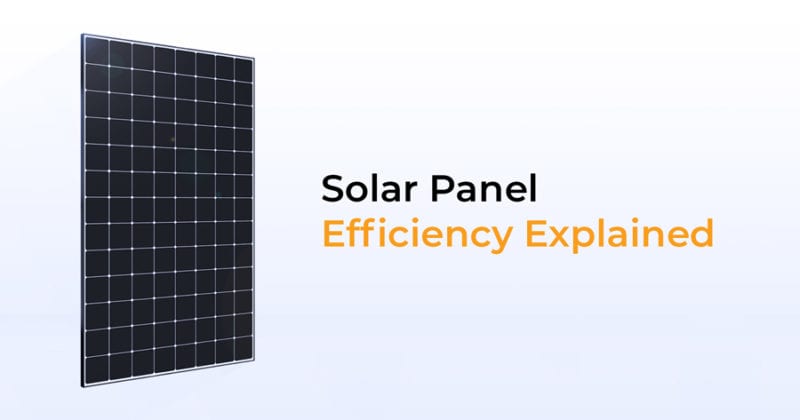Solar Panel Efficiency Explained

Solar panel efficiency refers to the percentage of sunlight that is being converted into electric power by the solar panels. Also known as the “conversion rate,” solar panel efficiency is one of the key things to consider when buying solar panels, as this would indicate how much solar power you will be getting from your solar system. Solar panels with a higher efficiency rating will generate more power than those with lower efficiency ratings. A high efficiency panel also means you’ll require less roof space when compared to lower efficiency panels, making it ideal for those with limited roof space availability.
Conversion rates can vary depending on the quality of manufacturing, techniques and the materials used. The average solar efficiency rating sits at 11-22%, although scientists in Australia have recently developed a cell with an efficiency of 34.5%.
What Factors Influence Solar Panel Efficiency?
There are several factors that can influence a solar panels’ efficiency rating. Weather conditions, such as particularly cloudy days, can decrease the power your panels generate as there is less sunlight hitting the surface of the cells. Other relative factors include:
- Solar Panel Type
The material used in manufacturing solar panels will affect their efficiency ratings. Thin-film solar panels, although the cheapest types, are also the least efficient in converting sunlight into power. Ideally, silicon-based panels, such as polycrystalline and monocrystalline solar panels have higher conversion rates and will produce more power.
- Placement on roof
Your roof’s relative steepness and orientation is also a determiner of how efficient your solar panels will be in generating power. In Australia, the ideal direction for your panels to produce maximum power is north, with an angle of 20 to 30 degrees. East and west-facing panels will also yield a decent amount of power if north isn’t an option and will still ensure adequate solar panel efficiency ratings.
- Dirt
Most likely, the only maintenance solar panels need is keeping them clean and dust-free. Dirt and grime can lower solar panel performance, decreasing their efficiency rating by around 5%.
- Temperature
Contrary to most people’s assumptions, it’s lower temperatures that are better for your solar panels’ efficiency rating. Intense increases in temperature can damage solar cells and materials, thus decreasing your panels’ life span. At higher temperatures, the semiconductor properties in solar panels shift – meaning a mild spike in current but a heavier decrease in voltage. To determine how much power a panel loses due to rise in temperature, you look at the temperature coefficient (Pmax) on your panels’ spec data sheet. It is determined by how much power the panel will lose when the temperature rises by 1°C above 25°C.
Importance of Solar Panel Efficiency
Manufacturers are working towards making solar panels more affordable and accessible to everyone. However, it’s important to ensure you’re purchasing a quality solar panel, rather than opting for the cheapest system. Efficiency is an important quality to look for when buying solar panels, as a high efficiency panel is generally made with good-quality materials and follows comprehensive manufacturing techniques.
In the current market, SunPower has the highest panel efficiency ratings compared to competitors, such as REC, LG and Panasonic. With a conversion rate of 22.8% from some of their most popular models, SunPower is ranked no. 1 amongst solar panels with the highest solar panel efficiency ratings in 2019. Making up the top five, SunPower is followed by LG (21.7%), REC Solar (21.7%), Panasonic (20.3%), and Silfab (20%).
Infinite Energy has been a provider of SunPower solar panels for many years, providing quality, reliable systems to thousands of customers. If you’d like to discuss the suitability of SunPower, or any other solar panels for your home or business, contact us today.


